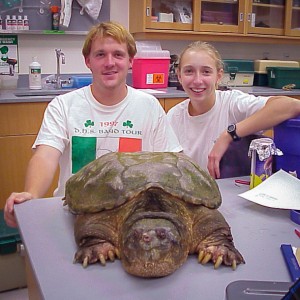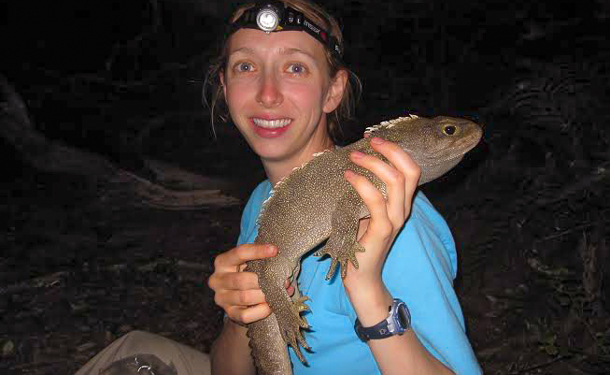Harrisonburg native and biology professor Kristine Grayson comes to Eastern Mennonite University to present a Suter Science Seminar on a common problem for the conservation and management of endangered populations.
She’ll share her research about tuatara (Sphenodon punctatus), an endemic and rare reptile of New Zealand, in a seminar Friday, Nov. 6, at 4 p.m. in Suter Science Center 106.
“In many species, offspring sex is not determined by chromosomes but instead develops based on environmental conditions,” explains Grayson, who teaches in the biology department at University of Richmond. “My research on tuatara living in islands offshore of New Zealand examined the potential for increased environmental temperature and sex ratio bias to endanger an isolated population.”

Despite that populations may appear numerically stable, the sex ratio in tuatara populations may be “an underappreciated threat to long-term viability,” she said.
Professor Jim Yoder, who with his wife Kathy has led three cross-cultural trips to New Zealand in 2010, 2012 and 2015, invited Grayson to speak. The groups he’s led focus on conservation biology and the effects of invasive species, in addition to work with the indigenous Maori people, and the 2015 summer group met with Grayson’s colleagues (she was back in the States by that time) and toured the lab where she had worked.
“Tuatara are a great case study for the ‘Conservation Biology’ class as well as my first-year ‘Concepts in Biology’ class, as we are currently studying evolutionary biology and will be focusing on invasive species, which is the primary threat to tuatara, later this semester,” he said.
From the Valley to Tuatara-Land
Grayson grew up in Harrisonburg, the daughter of two professors. Her mother, Joann Grayson, is a professor of psychology at James Madison University (JMU) and an expert in the field of child and family abuse. Her father, Phillip Grayson, is a scenery and lighting expert who retired after 26 years at JMU and is on the adjunct faculty at EMU.

In her youth, Grayson says she thought about studying environmental law, but her love of interacting with animals and the environment won over. She graduated from Davidson College in 2003 and decided to take a year off, unknowingly sowing the seeds of a future post-doctoral fellowship when she attended a conference in Australia on amphibians and reptiles. “The head of the tuatara research project mentioned that I should get in touch if I ever wanted to work on tuatara.”
At University of Virginia, she focused her dissertation research on migratory trade-offs of amphibians. But she never forgot the tuatara, and in 2010, six years later, she emailed the director of the project that she had met so many years ago in New Zealand.
That led to a grant proposal with the National Science Foundation, and in 2011, “we packed up our family to move to New Zealand for a year and a half.”
Travel and research challenges
Grayson says the experience of living and working in a different country, and best of all for the biologist, “seeing different ecosystems,” was rewarding, but also challenging. Based out of Victoria University of Wellington, she had to learn “a whole new research system and the logistics of doing research in a totally different place.”
“Tuatara are highly protected in New Zealand and the permitting process to conduct research is quite extensive, as well as the logistics of getting to the islands where they live,” she said. “This was much different than walking up to a pond in your backyard with a net to catch salamanders!”
Grayson’s current research also examines the spread potential of gypsy moth, an invasive forest pest, at the southern invasion front.
